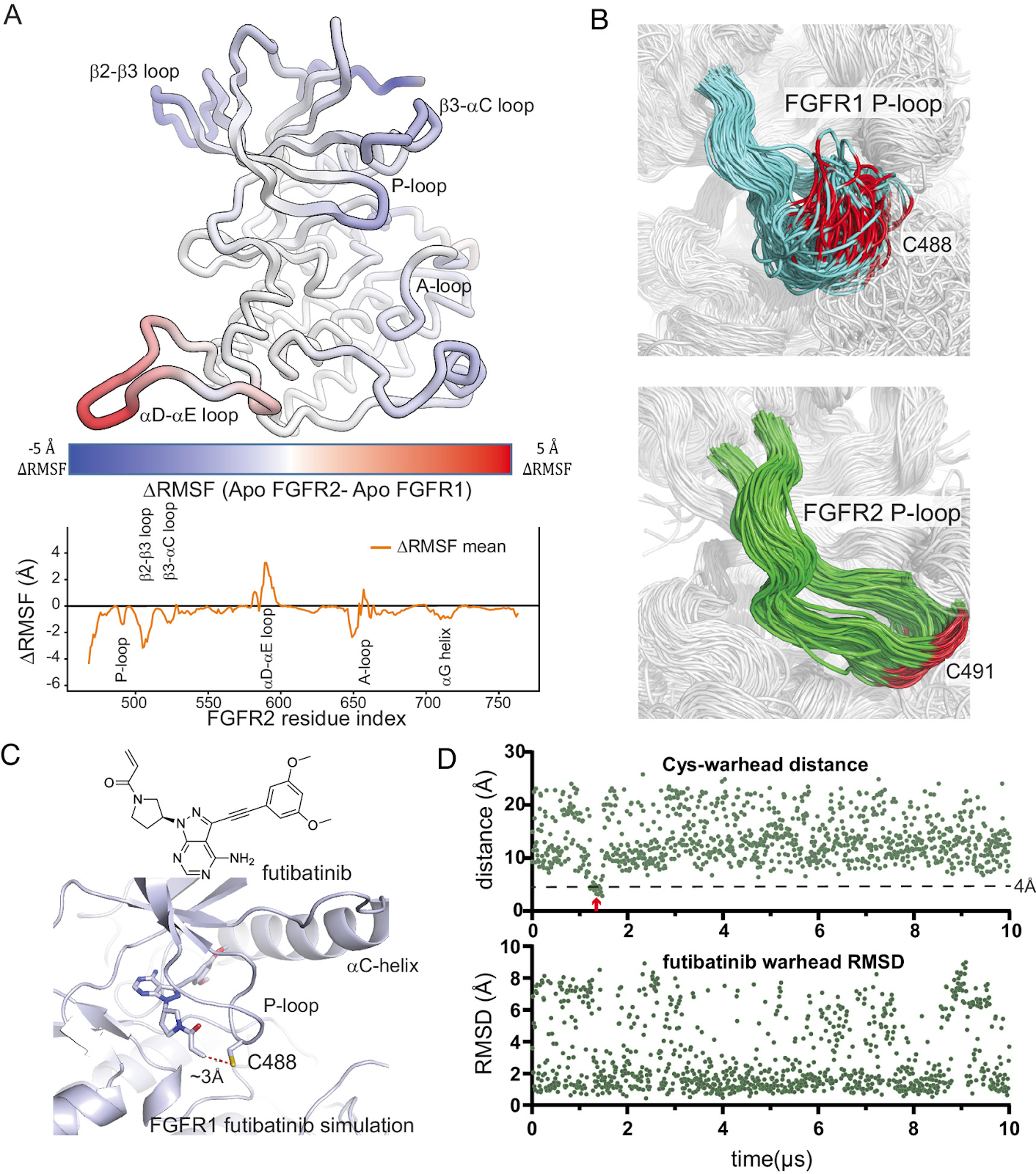Fibroblast growth factor receptor (FGFR) kinase inhibitors have been shown to be effective in the treatment of intrahepatic cholangiocarcinoma and other advanced solid tumors harboring FGFR2 alterations, but the toxicity of these drugs frequently leads to dose reduction or interruption of treatment such that maximum efficacy cannot be achieved. The most common adverse effects are hyperphosphatemia caused by FGFR1 inhibition and diarrhea due to FGFR4 inhibition, as current therapies are not selective among the FGFRs. Designing selective inhibitors has proved difficult with conventional approaches because the orthosteric sites of FGFR family members are observed to be highly similar in X-ray structures. In this study, aided by analysis of protein dynamics, we designed a selective, covalent FGFR2 inhibitor. In a key initial step, analysis of long-timescale molecular dynamics simulations of the FGFR1 and FGFR2 kinase domains allowed us to identify differential motion in their P-loops, which are located adjacent to the orthosteric site. Using this insight, we were able to design orthosteric binders that selectively and covalently engage the P-loop of FGFR2. Our drug discovery efforts culminated in the development of lirafugratinib (RLY-4008), a covalent inhibitor of FGFR2 that shows substantial selectivity over FGFR1 (~250-fold) and FGFR4 (~5,000-fold) in vitro, causes tumor regression in multiple FGFR2-altered human xenograft models, and was recently demonstrated to be efficacious in the clinic at doses that do not induce clinically significant hyperphosphatemia or diarrhea.
A blog highlighting recent publications in the area of covalent modification of proteins, particularly relating to covalent-modifier drugs. @CovalentMod on Twitter, @covalentmod@mstdn.science on Mastodon, and @covalentmod.bsky.social on BlueSky
Tuesday, February 6, 2024
Discovery of lirafugratinib (RLY-4008), a highly selective irreversible small-molecule inhibitor of FGFR2
Schönherr, H.; Ayaz, P.; Taylor, A. M.; Casaletto, J. B.; Touré, B. B.; Moustakas, D. T.; Hudson, B. M.; Valverde, R.; Zhao, S.; O’Hearn, P. J.; Foster, L.; Sharon, D. A.; Garfinkle, S.; Giordanetto, F.; Lescarbeau, A.; Kurukulasuriya, R.; Gerami-Moayed, N.; Maglic, D.; Bruderek, K.; Naik, G.; Gunaydin, H.; Mader, M. M.; Boezio, A. A.; McLean, T. H.; Chen, R.; Wang, Y.; Shaw, D. E.; Watters, J.; Bergstrom, D. A.
Proceedings of the National Academy of Sciences 2024, 121 (6), e2317756121. https://doi.org/10.1073/pnas.2317756121.
A Tandem Bioorthogonal Retro-Cope and Cope Elimination for the Activation of Covalent Inhibitors with an Acrylamide or Vinylsulfonamide Warhead in Live Cells
Yan Huang, Miao Liu, Dongguang Fan, Fan Xu, Fushuang Xiang, Qingqiang Min, and Xingyue Ji Journal of the American Chemical Society 2026 DOI:...
-
Design, synthesis and biological evaluation of the activity-based probes for FGFR covalent inhibitorDandan Zhu, Zijian Zheng, Huixin Huang, Xiaojuan Chen, Shuhong Zhang, Zhuchu Chen, Ting Liu, Guangyu Xu, Ying Fu, Yongheng Chen, European Jo...
-
DOI Ansgar Oberheide, Maxime van den Oetelaar, Jakob Scheele, Jan Borggräfe, Semmy Engelen, Michael Sattler, Christian Ottmann, ...
-
Nafizul Haque Kazi, Nikolas Klink, Kai Gallant, Gian-Marvin Kipka & Malte Gersch Nat Struct Mol Biol , 2025 https://doi.org/10.1038/s415...

